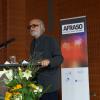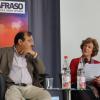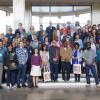Our third conference in the series of “African-Asian Encounters” took place from September 28–30, 2016, in Frankfurt/Main, Germany. More than 80 participants discussed African-Asian interactions from an interdisciplinary perspective, exploring the conference theme “Afrasian Transformations: Beyond Grand Narratives?” at Goethe University. Conference participants questioned the grand narratives usually present in research on African-Asian interactions, that is, models, concepts and theories. Another grand theme was the future of area studies, specifically how transregional studies have reshaped our understanding of “area”.
The conference started with a public keynote lecture by Homi K. Bhabha (Harvard University) on „Intimations of the Afterlife: On Migration, Memory and the Dialectics of Translation”, in which he addressed the current migration phenomenon to Europe from a philosophical perspective, analyzing the role of death in migration under duress. After the keynote, participants presented and discussed their research in the panels of four subthemes: Redefining the Global South, Reassessing the Indian Ocean, Afrasian Approaches to Development, and Afrasia in a Wider World. The first day of the conference concluded with the world premiere of the third AFRASO film “Small-scale Gold Mining: Chinese Operations in Cameroon” with an introduction by project member Diderot Nguepjouo.
Highlights of the second day included a round table discussion on “Which Way Area? Transregional Studies in a Multipolar World” between Homi K. Bhabha, Ajay K. Dubey (Jawaharlal Nehru University), Jamie Monson (Michigan State University), Uta Ruppert (Goethe University), moderated by Frank Schulze-Engler (Goethe University). Another highlight at the end of the day was Jamie Monson’s Keynote on “Futures in the Past of Africa-China Engagement”, in which she challenged the presentist framing of scholarship on current China-Africa interactions.
Day 3 saw the keynote of Ajay K. Dubey on “India-Africa Relations in the 21st Century: The Competitive Edge and Challenges of One of Africa’s Asian Options”. Dubey put a spotlight on trade and development assistance and compared India’s and China’s engagement. The closing panel on “Afrasian Transformations: Observations, Responses, and Future Challenges” with Adams Bodomo (University of Vienna), Mamadou Diawara (Goethe University), and Astrid Erll (Goethe University), chaired by Frank Schulze-Engler, appraised the conference’s success in challenging the grand narratives dominant in the various disciplines and transregional research. They pushed for a critical examination of disciplines and an expansion of areas of interest, calling for sustainable structures to continue research on Afrasian issues.
In addition to a broad scope of presentations in the panels, ranging from perspectives on natural resources to microcredits, from soft power to south-south solidarity and from migration to state building and place making, the conference also offered a rich supporting program. Sharlene Khan’s exhibition/video installation “When the Moon Waxes Red (2009–2016)”, the performance “Blickakte – Acts of Viewing” and the third AFRASO-Film “Small-Scale Gold Mining: Chinese Operations in Cameroon” offered unique additional perspectives to the presentations of research and scholarly discussion.
Ruth Achenbach, IZO








